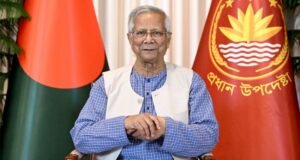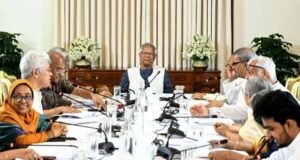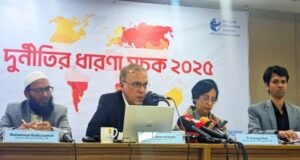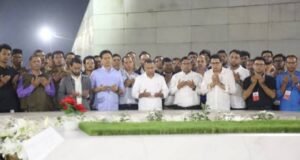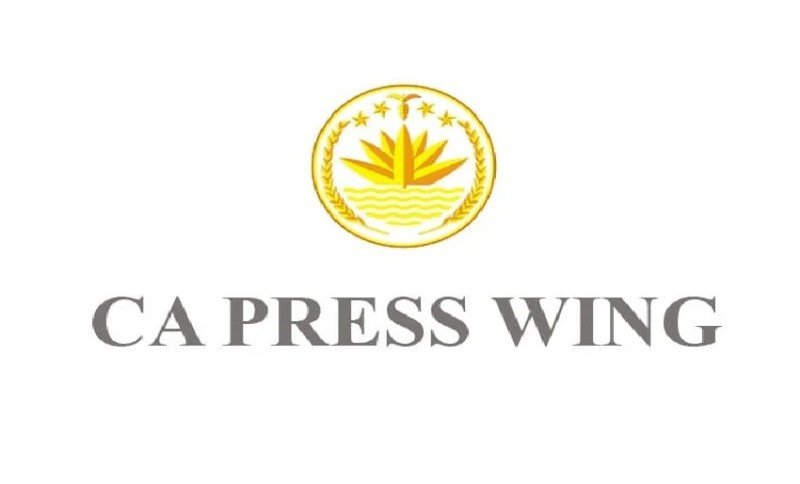
The Press Wing of Chief Adviser has strongly rejected a series of articles by Turkish journalist Uzay Bulut, accusing her of spreading false and Islamophobic narratives about Bangladesh.
In an official statement published Friday on its verified Facebook page, “CA Press Wing Facts,” the government described Bulut’s reporting as a deliberate distortion of facts aimed at maligning the country’s interim administration.
According to the statement, Bulut published multiple articles across platforms such as European Conservative, The Front Page and Gatestone Institute, in which she claimed that Bangladesh is heading toward “Talibanization” under its interim government.
One such article titled “The Talibanization of Bangladesh”, published on June 15 in The European Conservative and earlier in The Front Page in February, accused the interim regime of radicalizing the country and systematically targeting minorities.
The Press Wing refuted these claims, calling them “baseless” and “eerily similar” to propaganda previously spread by the now-ousted Awami League regime.
The statement emphasized that 2024 movement that led to the fall of Sheikh Hasina’s government was a broad-based, democratic uprising involving students, teachers, civil society and citizens from all backgrounds; including religious minorities.
“There is no credible evidence that radical extremists led or influenced the movement,” the statement said, adding that Dr. Muhammad Yunus was invited to lead the interim government by the movement’s leadership, not installed by any foreign power as Bulut suggested.
One of the most controversial claims in Bulut’s article is that the interim government was responsible for the death of Hindu leader Bhabesh Chandra Roy, who was allegedly abducted and murdered in April 2025. The Press Wing cited multiple investigations that debunked this version of events.
Although The Daily Star initially reported Roy’s death as an abduction and murder, the newspaper later retracted the report after an internal review and confirmation from law enforcement that Roy had died of natural causes. An inquest found no signs of assault and witness accounts suggested that Roy had collapsed due to health complications. Local doctors had urged immediate hospitalization before his passing.
Further investigations by The Business Standard pointed to financial stress and pre-existing health issues as contributing factors. The Press Wing also noted that the family never claimed he was beaten, despite concerns from his wife about the sudden nature of his death.
The government also criticized Bulut for relying heavily on reports from the Bangladesh Hindu Buddhist Christian Unity Council (BHBCUC) and the Rights and Risks Analysis Group (RRAG), both of which have been accused of exaggerating or misrepresenting data.
The BHBCUC had claimed over 2,000 attacks on minorities in just a two-week span in August 2024. However, a police review revealed that only 20 incidents showed any signs of communal motivation. The majority were political in nature and 161 claims were found to be entirely false. Only 62 formal cases were registered, leading to 35 arrests.
Fact-checking by BanglaFact and Press Institute Bangladesh (PIB) further revealed that reports of 11 minority deaths between January and February 2025 were misrepresented. None of the deaths were linked to communal violence; three were due to personal disputes, six were linked to thefts, one was a kidnapping and one was undetermined. Victims’ families did not attribute any of the incidents to religious persecution.
Examples include the murder of Notre Dame College staffer Lipika Gomes in Dhaka, which was determined to be a robbery and the death of Sabita Rani in Gaibandha, found to be the result of a business dispute. Similar findings were reported in Chattogram, where a fatal conflict stemmed from a property issue, not religious animosity.
Chief Adviser’s Press Secretary Shafiqul Alam noted that even BHBCUC’s own report on 23 alleged communal killings included cases tied to theft, accidents, family disputes and other unrelated issues. “These are not signs of systematic religious persecution,” he said.
New Delhi-based RRAG was also criticized for promoting misleading claims of targeted political violence. A June 2025 report alleged that 123 Awami League members were systematically attacked between August 2024 and April 2025.
However, investigations showed that most of these cases stemmed from personal or criminal motives.
Examples include Nachol double murder, initially labeled a political killing by RRAG, which was later confirmed by family members to be the result of a local feud. Similarly, the murder of Arina Begum; linked by RRAG to political motives, was determined to be a case of domestic violence, with her husband as the main suspect.
The Press Wing accused RRAG of repeatedly publishing exaggerated and misleading reports on Bangladesh, citing their earlier inflated figures on journalist repression and conflict in the Chittagong Hill Tracts.
The government further criticized Uzay Bulut’s history of biased journalism, noting her prior work had been discredited, including by The Armenian Weekly in 2017. It accused her of promoting Islamophobic narratives and using selective sourcing to construct a distorted image of Bangladesh.
“Her articles substitute propaganda for journalism and obscure the complexities of Bangladesh’s current reality,” the statement said.
The Press Wing reaffirmed the interim government’s commitment to protecting the rights of all citizens, regardless of religion or political affiliation and warned against misinformation campaigns designed to undermine the country’s democratic transition.
 Weekly Bangla Mirror | Bangla Mirror, Bangladeshi news in UK, bangla mirror news
Weekly Bangla Mirror | Bangla Mirror, Bangladeshi news in UK, bangla mirror news


